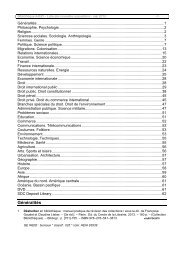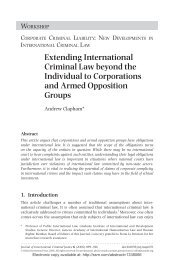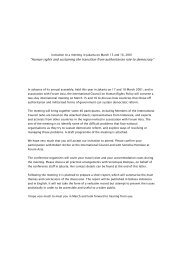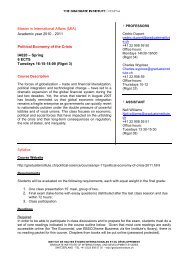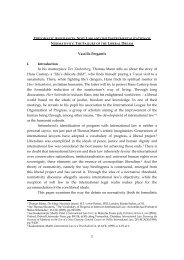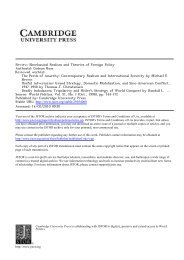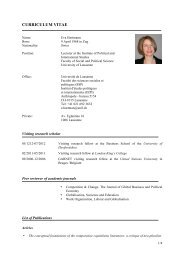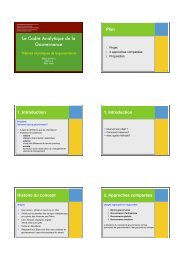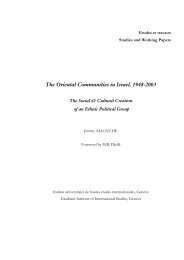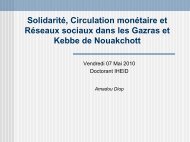Download - The Graduate Institute, Geneva
Download - The Graduate Institute, Geneva
Download - The Graduate Institute, Geneva
You also want an ePaper? Increase the reach of your titles
YUMPU automatically turns print PDFs into web optimized ePapers that Google loves.
“But we have a chance!” West Germany’s Efforts against International<br />
Terrorism at the UN in the 1970s<br />
Bernhard Blumenau, <strong>Graduate</strong> <strong>Institute</strong>, <strong>Geneva</strong><br />
“[In the fight against international terrorism,<br />
we have to] convince governments that they<br />
should stand together or they will hang separately.”<br />
1 Robert S. Ingersoll, 1975<br />
Introduction<br />
<strong>The</strong> 1970s were marked by an increased number of acts of international terrorism. As the<br />
above -quote shows, it was a concern to the international community and perceived as a serious<br />
threat, at least by Western countries. For West Germany, it was most certainly an important<br />
concern.<br />
Yet, West German foreign policy in the 1970s is most often associated with Ostpolitik,<br />
economic summits, as well as the tensions that had risen since the inauguration of Jimmy<br />
Carter in the US and that manifested themselves on issues such as the neutron bomb and the<br />
NATO missiles. <strong>The</strong> issue of terrorism does not appear in most academic assessments of<br />
Bonn’s foreign policy preoccupations at the time. Yet, terrorism was a major concern for the<br />
federal government and also found its way into foreign policy strategies. This paper will shed<br />
light on this often-neglected concern for the Auswärtiges Amt (AA) and will assess why and<br />
how West Germany attended to this issue on the international level. In order to do so, the Federal<br />
Republic’s encounter with terrorism will first be assessed to understand the importance of<br />
this problem for Bonn. <strong>The</strong>n, the Federal Republic’s strategy in the most significant international<br />
organisation, the United Nations (UN), will be explained and analysed. Finally, the conclusions<br />
will elaborate on the success and shortcoming of Bonn’s anti-terrorism policy at the<br />
UN.<br />
Literature on German foreign policy in the 1970s is bourgeoning. Yet, the aspect of<br />
how West German diplomacy attended to terrorism has not yet been examined aside from a<br />
1 Memorandum From the Acting Secretary of State (Ingersoll) to President Ford, Washington, February 18, 1975;<br />
National Archives, RG 59, Central Foreign Policy Files, P750037–0744, Secret.<br />
1
few topical assessments; and no study has been published thus far in English. 2 Likewise, while<br />
the literature on terrorism has proliferated a truly historical study on the evolution of terrorism<br />
and anti-terrorism is still rather the exception. 3 This paper will hence contribute to closing<br />
these gaps.<br />
As far as sources are concerned, this paper is based mostly on published and unpublished<br />
documents from the West German Auswärtiges Amt, which have only recently become<br />
accessible. Due to rigid classification rules, many documents remain inaccessible today. In order<br />
to overcome this, the paper also draws from documents from US archives and on secondary<br />
sources, such as memoirs and interviews.<br />
Defining terrorism is no simple endeavour. As this paper will show, it was not easy for<br />
politicians and diplomats in the 1970s, and it certainly is not easy for scholars today. A plethora<br />
of different definitions exist. 4 For the purpose of this paper, “terrorism” shall refer to violent<br />
acts deliberately committed against civilians. <strong>The</strong>se acts intend to have psychological effects<br />
beyond the immediate targets and on a broader audience. <strong>The</strong>y are committed in order to<br />
further a political agenda. <strong>The</strong>y are perpetrated by a sub-state actor operating in one state with<br />
the ultimate intention to make a government comply with its demands. 5<br />
West Germany’s Encounter with Terrorism<br />
Like most Western countries, the Federal Republic was hit by an unprecedented wave of protest<br />
in the mid and late 1960s. Towards the end of the decade, more and more of these protests<br />
became violent. 6 But with a new social-democratic government formed and Willy Brandt’s<br />
2 See for instance Matthias Dahlke, Der Anschlag Auf Olympia '72: Die Politischen Reaktionen Auf Den Internationalen<br />
Terrorismus in Deutschland (Munich: Martin Meidenbauer Verlag, 2006); Johannes Hürter and Gian<br />
Enrico Rusconi, eds., Die Bleiernen Jahre. Staat Und Terrorismus in Der Bundesrepublik Deutschland Und Italien<br />
1969-1982 (Munich: Institut für Zeitgeschichte, Oldenbourg, 2010); Michael März, Die Machtprobe 1975 :<br />
Wie RAF Und Bewegung 2. Juni Den Staat Erpressten (Leipzig: Forum Verlag, 2007).<br />
3 In most assessments of terrorism, the history is dealt with rather en passant, see for instance: . An exception that<br />
deals with at least some aspects in the long evolution of terrorism is the book by Gérard Chaliand and Arnaud<br />
Blin, eds., <strong>The</strong> History of Terrorism. From Antiquity to Al Qaeda (Berkeley etc: University of California Press,<br />
2007). Another good, albeit short, historical overview over the past 150 years can be found in David C. Rapoport,<br />
"<strong>The</strong> Four Waves of Modern Terrorism," in Attacking Terrorism: Elements of a Grand Strategy, ed. Audrey<br />
Kurth Cronin and James M. Ludes (Washington: Georgetown University Press, 2004).<br />
4 See for instance this failed attempt from the 1980s to collect all definitions and to merge them into a default<br />
definition: A. P. Alex Schmid, Political Terrorism: A New Guide to Actors, Authors, Concepts, Data Bases,<br />
<strong>The</strong>ories and Literature (Amsterdam ; Oxford: North-Holland Publ. , 1988).<br />
5 This is my working definition. It’s a synthesis of many different definitions that exist in scholarly literature and<br />
comes closest to the understanding of terrorism in the 1970s in the West.<br />
6 For the international character of “1968” see Timothy Brown, ""1968". East and West: Divided Germany as a<br />
Case Study in Transnational History," <strong>The</strong> American Historical Review 114, no. 1 (2009); Martin Klimke and<br />
Joachim Scharloth, eds., 1968 in Europe. A History of Protest and Activism, 1956-1977 (New York, Houndmills:<br />
Palgrave Macmillan, 2008); Jeremi Suri, Power and Protest. Global Revolution and the Rise of Detente (Cambridge,<br />
Mass., London: Harvard University Press, 2003).<br />
2
promise to “risk more democracy”, the majority of the protesters tired of revolution and were<br />
eager to resume a normal life. Yet, some of the more radical members of the protests groups<br />
went underground and continued their fight. This was the case in the United States with the<br />
Weathermen Underground, in Italy with the Red Brigades and also in West Germany. A faction<br />
of the protesters became radical and continued their struggle with violent means. <strong>The</strong> Rote<br />
Armee Fraktion (Red Army Faction, RAF) – or Baader Meinhof Gang named after Andreas<br />
Baader and Ulrike Meinhof – is the most infamous example but there were others too: the Berlin-based<br />
“Bewegung Zweiter Juni” (Second of June Movement) and the “Revolutionäre Zellen”<br />
(Revolutionary Cells). 7<br />
<strong>The</strong> Red Army Faction was founded in 1970 and despite what its other name “Baader<br />
Meinhof Gang” suggests, was not led by Baader and Meinhof but instead by Baader and<br />
Gudrun Ensslin. Meinhof’s task was to provide the broader public with “ideological” justifications<br />
for RAF attacks. Baader was the undisputed commander-in-chief who found a totally devoted<br />
second-in-command in his loyal lover Ensslin. <strong>The</strong>y began their activism with an arson<br />
in a Frankfurt shopping mall in 1968. Following the recommendations in Carlos Marighella’s<br />
Mini-manual of the Urban Guerrilla they then escalated their actions to include bank robberies,<br />
theft and – eventually – attacks against American or West German offices and officials.<br />
Due to modernisation efforts, such as the use of computers and grid searches, at the Federal<br />
Criminal Office by its new president, Horst Herold, all key leaders of this first generation of<br />
the RAF were arrested in 1972. Yet soon after that, a new generation emerged whose preoccupation<br />
was to free their glorified leaders from prison. As far as the ideological basis of the RAF<br />
was concerned, it was practically inexistent. As Audrey Kurth Cronin quite pointedly put it:<br />
“To say that they had an ideology would be an overstatement, as their guiding principles<br />
seemed to be a kind of cafeteria-style reference to ideas from Marxist-Leninism (especially<br />
anti-imperialism), anarchism, and the philosopher Frantz Fanon’s theories about the beneficial,<br />
cleansing role of violence.” 8 This medley of ideological influences had disappeared altogether<br />
when the second generation took over. This new group of terrorist was only fully operational<br />
in 1975 as some of their members had been arrested before which delayed the planning for<br />
new attacks. <strong>The</strong>ir first big action was a raid on the West German embassy in Stockholm in<br />
April 1975.<br />
Some months before, however, members of the Second of June Movement had kidnapped<br />
Peter Lorenz, a Christian-conservative politician running for the office of mayor of<br />
7 For more information on the RAF see for instance the two-volume edition by Wolfgang Kraushaar, ed., Die RAF<br />
Und Der Linke Terrorismus, 2 vols. (Hamburg: Hamburger Edition, 2006).<br />
8 Audrey Kurth Cronin, How Terrorism Ends. Understanding the Decline and Demise of Terrorist Campaigns<br />
(Princeton, Oxford: Princeton University Press, 2009), 97.<br />
3
Berlin. Upon pressure by CDU leader Helmut Kohl – and with Chancellor Schmidt being bedridden<br />
with influenza - the federal government decided to give in to the kidnappers’ demands<br />
and released several terrorists from prison. <strong>The</strong>y were flown to Southern Yemen and each of<br />
them was furnished with a considerable amount of money. 9 According to his own testimony,<br />
Helmut Schmidt always had doubts about giving in to terrorist demands and regretted the federal<br />
government’s decision. In hindsight, the following was maintained regarding the Lorenz<br />
case: “It was my biggest mistake that I backed down during the Lorenz kidnapping.” 10 He<br />
therefore decided that henceforth, the German government would no longer concede to terrorist<br />
demands. <strong>The</strong> litmus test for this new policy of non-negotiation soon came in April 1975,<br />
when RAF terrorists raided Bonn’s embassy in Stockholm and held all diplomats hostage, executing<br />
two of them to show the seriousness of their intentions. <strong>The</strong>y demanded the release of<br />
top level of RAF members from prison. This time, however, Bonn stood firm and Schmidt explained<br />
to a shocked Olof Palme that “we do not negotiate. We are lifting extraterritoriality.” 11<br />
While the Swedish police was preparing to storm the embassy, the explosives that had been<br />
planted by the terrorists suddenly detonated. <strong>The</strong> hostages were saved and the terrorists arrested<br />
and extradited to Germany. 12 As Schmidt explained in hindsight:<br />
Once again, as in the case of the kidnapping of the member of the Berlin parliament<br />
Peter Lorenz, we had to balance two considerations: One the one<br />
hand, to safe directly threatened lives while on the other hand, to counter<br />
threats to the most vital function of every state, to provide secure for the<br />
lives of all its citizens.<br />
And he continued by stressing that had he given in at Stockholm “we could have soon been at<br />
the end of all security.” 13 A new policy line on terrorism had been established and implemented,<br />
one that has been the official guiding German policy until today.<br />
From the RAF’s perspective, the unsuccessful outcome of the Stockholm attack necessitated<br />
some restructuring and new planning. Increasing pressure from Baader and Ensslin<br />
from within their high-security prison Stammheim forced the RAF to commit a new series of<br />
attack in what was to enter history books as the “German Autumn” of 1977. It started with the<br />
assassinations of Federal Prosecutor General Siegfried Buback in early April 1977 and<br />
9 For more information on this see Stefan Aust, Der Baader-Meinhof Komplex (Hamburg: Hoffmann und Campe,<br />
2008), 56; Matthias Dahlke, "Nur Eingeschränkte Krisenbereitschaft. Die Staatliche Reaktion Auf Die Entführung<br />
Des Cdu-Politikers Peter Lorenz 1975," Vierteljahrshefte für Zeitgeschichte 55, no. 4 (2007).<br />
10 Helmut Schmidt quoted in Martin Rupps, Helmut Schmidt: Eine Politische Biographie (Stuttgart: Hohenheim,<br />
2002), 236. My translation.<br />
11 Schmidt cited in Michael Schwelien, Helmut Schmidt: Ein Leben Für Den Frieden (Hamburg: Hoffmann und<br />
Campe, 2003), 290-291. My translation.<br />
12 For more information see März.<br />
13 Rupps, 241. My translation.<br />
4
Dresdner Bank manager Jürgen Ponto in late August and found its climax in the double crisis<br />
of September and October 1977. First, on 5 September Hans-Martin Schleyer, president of the<br />
German Industrialists’ Association was kidnapped. <strong>The</strong> RAF, which claimed responsibility for<br />
this, demanded the release of all key RAF members from prison. As the federal government<br />
did not give in to their demand, Palestinians of the Popular Front for the Liberation of Palestine-Special<br />
Command (PFLP-SC) added pressure on Chancellor Schmidt by hijacking a Lufthansa<br />
jet on 13 October. <strong>The</strong>y rerouted it several times until it was stormed by a special antiterrorist<br />
commando, the GSG 9, of the German border guards in Mogadishu, early on 17 October.<br />
After they got word of the failed operation, Baader, Ensslin and several other imprisoned<br />
terrorists committed suicide. Several days later the dead body of Schleyer was found in Mulhouse.<br />
14 <strong>The</strong> German Autumn had come to an end. At the same time Schmidt’s crisis management<br />
had drastically increased his popularity ratings, which were unmatched by his predecessors<br />
or successors. 15 <strong>The</strong> government had not given in to the terrorists and the Rechtsstaat<br />
had prevailed.<br />
<strong>The</strong> year 1977 consequently marked the peak of terrorism in and against West Germany.<br />
Although the RAF continued to attack representatives of the state until the early 1990s,<br />
the intensity and violence of 1977 was never matched again. In 1992, the Red Army Faction<br />
declared a “truce” and officially dissolved itself in 1998. 16<br />
While the RAF was certainly the most infamous German terrorist group, the Second of<br />
June Movement and the Revolutionary Cells also committed attacks that claimed victims and<br />
contributed to the subjective feeling of insecurity in West Germany in the 1970s. <strong>The</strong> most<br />
mediatised operation by the Second of June Movement was the assassination of the president<br />
of the West Berlin court, Günter von Drenckmann in 1974 and the kidnapping of the Austrian<br />
industrialist Walter Palmers in 1977. <strong>The</strong> story of the Movement ends in the early 1980s, when<br />
it merged with the RAF. 17<br />
14 Bundesregierung der Bundesrepublik Deutschland, Dokumentation Der Bundesregierung Zur Entführung Von<br />
Hanns Martin Schleyer: Ereignisse Und Entscheidungen Im Zusammenhang Mit Der Entführung Von Hanns<br />
Martin Schleyer Und Der Lufthansa-Maschine "Landshut" Nach Mogadishu, ed. Bundespresseamt (Augsburg:<br />
Goldmann, 1977), 133-180. For a detailed account of the odyssey of the ‘Landshut’ aircraft see Tim Geiger, "Die<br />
"Landshut" In Mogadischu. Das Außenpolitische Krisenmanagement Der Bundesregierung Angesichts Der Terroristischen<br />
Herausforderung 1977," Vierteljahreshefte für Zeitgeschichte 57, no. 3 (2009).<br />
15 Rupps, 248.<br />
16 Alexander Straßner, "Die Dritte Generation Der RAF. Terrorismus Und Öffentlichkeit," in Die RAF. Entmythologisierung<br />
Einer Terroristischen Organisation, ed. Wolfgang Kraushaar (Bonn: Bundeszentrale für politische<br />
Bildung, 2008).<br />
17 Literature on the Movement is sparse, see for instance Lutz Korndörfer, "Terroristische Alternative in Der<br />
BRD: Die Bewegung 2. Juni," in Sozialrevolutionärer Terrorismus. <strong>The</strong>orie, Ideologie, Fallbeispiele, Zukunftsszenarien,<br />
ed. Alexander Straßner (Wiesbaden: VS Verlag für Sozialwissenschaften, 2008); Klaus Weinhauer,<br />
"Terrorismus in Der Bundesrepublik Der Siebzigerjahre. Aspekte Einer Sozial- Und Kulturgeschichte Der Inneren<br />
Sicherheit," Archiv für Sozialgeschichte 44 (2004).<br />
5
<strong>The</strong> third terrorist group, the Revolutionary Cells has never officially dissolved itself. 18<br />
Contrary to the RAF and the Second of June Movement, the Cells were marked by a cell structure<br />
that allowed its groups to operate independently which was different from the other two<br />
very hierarchically organised groups. Moreover, the members of the Cells never went entirely<br />
underground. Most of them kept their normal legal existence and were hence sometimes referred<br />
to as “after-work terrorists”. 19 Members of the cells were involved in the OPEC hostage<br />
crisis of 1975 and in the hijacking of an El Al plane that was rerouted to Entebbe in 1976. 20<br />
As the examples above show, terrorism in the 1970s – especially the variant that was<br />
committed by or directed against Germans – was highly international in nature. German terrorist<br />
groups went abroad for training and committed their attacks against West German targets in<br />
foreign countries. Moreover, all terrorist groups closely cooperated with foreign actors, such as<br />
Palestinians, “terrorists for hire” like the infamous Carlos the Jackal, or – at least indirectly –<br />
with foreign countries, such as East Germany. 21 As the field of operation of the terrorist was<br />
the international realm, the West German government could only successfully fight terrorism<br />
by attacking international terrorism and striving for multilateral cooperation against terrorists.<br />
This was a consequence of two factors: First of all, West Germany’s policy of not negotiating<br />
with terrorists made the cooperation of foreign governments essential when it came to the solution<br />
of a terrorist crisis abroad and for the credible punishment of terrorists. Safe havens had to<br />
be abolished and states had to be under legal obligations to assist each other to the best extent<br />
possible. That was of particular importance when it came to Third World countries that had<br />
either shown blatant support for Western terrorists or at least benign indifference to them. Second,<br />
Germany’s Nazi past influenced anti-terrorism policies. Because of Hitler’s aggression<br />
and disrespect for other countries’ sovereignty, the federal government had to be extremely<br />
cautious regarding any intervention of its police abroad – military interventions were practically<br />
impossible for constitutional reasons. <strong>The</strong>y could only take place with the consent of the<br />
18 <strong>The</strong> Revolutionary Cells have not yet been the subject of much research. See for instance Johannes Wörle, "Erdung<br />
Durch Netzwerkstruktur? Revolutionäre Zellen in Deutschland.," in Sozialrevolutionärer Terrorismus. <strong>The</strong>orie,<br />
Ideologie, Fallbeispiele, Zukunftsszenarien, ed. Alexander Straßner (Wiesbaden: VS Verlag für Sozialwissenschaften,<br />
2008).<br />
19 "Findelkind Vor Der Tür," Der Spiegel, no. 38 (1982): 83.<br />
20 On the OPEC and Entebbe crises see for instance Michael Burleigh, Blood and Rage. A Cultural History of<br />
Terrorism (London: Harper Press, 2008), 181-182, 249-250.<br />
21 For the international links of German terrorist organisations see for instance Christopher Daase, "Die RAF Und<br />
Der Internationale Terrorismus. Zur Transnationalen Kooperation Klandestiner Organisationen," in Die RAF :<br />
Entmythologisierung Einer Terroristischen Organisation, ed. Wolfgang Kraushaar (Bonn: Bundeszentrale für<br />
politische Bildung, 2008); Tobias Wunschik, "Baader-Meinhof International?," Aus Politik und Zeitgeschichte,<br />
no. 40-41 (2007).<br />
6
foreign government concerned. 22 As the commander of the GSG 9 anti-terrorist squad, Ulrich<br />
Wegener, put it: “a solution à la Entebbe is not an option for us.” 23<br />
As far as reactions to this challenge of terrorism are concerned, two dimensions have to<br />
be examined. On the domestic level, the federal government had increased the competence of<br />
the federal police institutions such as the Federal Criminal Office or the Federal Border Guards<br />
– to which the GSG 9 belonged. Moreover, several bills of anti-terrorism legislation had been<br />
passed. 24 Yet, on the international level, norms and obligations regarding the cooperation of<br />
states against terrorists hardly existed. <strong>The</strong>refore, overcome this shortcoming, in 1976, West<br />
Germany launched its first big initiative at the UN.<br />
Bonn’s anti-terrorism strategies at the United Nations<br />
By the early 1970s, the United Nations had undergone a remarkable transformation and<br />
had witness a significant shift in power. While the emerging Western and Eastern blocs of the<br />
Cold War had had an absolute majority of votes in the late 1940s – and included the five members<br />
with veto power in the Security Council – the situation had changed over the following 20<br />
years. In the course of decolonisation, more countries in Africa and Asia became independent<br />
from their former mother countries and attempted to organise themselves as a new force globally.<br />
This was also reflected at the UN. By the early 1970s, the Third World had a two-third<br />
majority in the General Assembly (GA). Because of this, the Third World became a player to<br />
reckon with at the UN and pushed increasingly more determinedly for its topics - most importantly<br />
decolonisation and plans for a New International Economic Order - to be on the agenda<br />
of UN debates. 25 Western countries were anything but happy with these changes. President<br />
Richard Nixon found very drastic words to express his dissatisfaction with recent develop-<br />
22 See the assessment of the situation in a contemporary article: ""Kopf Runter, Wo Sind Die Schweine?" Wie Die<br />
Geiseln in Mogadischu Befreit Wurden," Der Spiegel, no. 44 (1977): 20.<br />
23 Wegener as quoted in: Schwelien, 305. My translation.<br />
24 For the domestic responses of the federal government see for instance the study by Victor Mauer, "Germany's<br />
Counterterrorism Policy," in How States Fight Terrorism. Policy Dynamics in the West, ed. Doron Zimmermann<br />
and Andreas Wenger (London: Boulder 2007), 68; Mario Petri, Terrorismus Und Staat. Versuch Einer Definition<br />
Des Terrorismusphänomens Und Analyse Zur Existenz Einer Strategischen Konzeption Staatlicher Gegenmaßnahmen<br />
Am Beispiel Der Roten Armee Fraktion in Der Bundesrepublik Deutschland (Munich: Meidenbauer,<br />
2007).<br />
25 Konrad Seitz, "Die Dominanz der Dritten Welt in den Vereinten Nationen," Europa-Archiv 28, no. 12 (1973):<br />
403-404; Lawrence Ziring, <strong>The</strong> United Nations: International Organization and World Politics, 4th ed. (Belmont:<br />
Thomson Wadsworth, 2005), 105-106.<br />
7
ments and referred to delegates from Third World countries as a “bunch of apes”. 26 It seemed<br />
that Western influence at – or control over – the UN was in decline.<br />
It was against this backdrop that the two German states, the German Democratic Republic<br />
(GDR) and the Federal Republic of Germany (FRG), were admitted o the world organisation<br />
in the autumn of 1973. <strong>The</strong> membership of both Germanys was only made possible because<br />
the two states had finally agreed on the basic relations between each other through the<br />
Basic Treaty of 1972, which ensured that neither the US nor the Soviet Union would veto their<br />
accession to the UN.<br />
Yet, prior to its admission West Germany already had an active observatory mission at<br />
New York that attentively watched – and tried to subtly influence – developments at the UN.<br />
Bonn’s diplomats were also unhappy with the new role of the Third World that was to become<br />
a “Chaosmacht” – or force of chaos - instrumentalising and paralysing the UN at its liking. 27<br />
When it came to the issue of terrorism, stances differed significantly. To begin with, agreeing<br />
on a common definition was an impossible endeavour. For the West, a “terrorist” was a person<br />
that committed political violence against a government or citizens of a state in order to force<br />
the government to concede to specific political demands. <strong>The</strong> perpetrator could be either a foreigner<br />
(in the perception of the 1970s that usually meant a Palestinian) or a national of the<br />
home country. 28 <strong>The</strong> Third World countries had a different understanding of what a “terrorist”<br />
was. Since many of these countries achieved independence only because of the actions of<br />
movements of national liberation, political violence committed in that context would not be<br />
illegal, and hence not terrorism. <strong>The</strong> same applied to movements that were still fighting for independence,<br />
for instance in Palestine and Southern Africa. “Terrorism” as the Third World understood<br />
the term, rather referred to governments depriving those movements of their right to<br />
self-determination. 29 Those governments – especially Israel and South Africa – however, were<br />
mostly close allies of the West. <strong>The</strong>re were hence considerable differences as to the definition<br />
of “terrorists”. It was under these circumstances that West Germany had to pursue its antiterrorism<br />
policies.<br />
26 Conversation Between President Nixon and the President’s Assistant for National Security Affairs (Kissinger),<br />
Washington, February 3, 1973, National Archives, Nixon Presidential Materials, White House Tapes, Oval Office,<br />
Conversation No. 840–12.<br />
27 Konrad Seitz, "Die Dritte Welt Als Neuer Machtfaktor Der Weltpolitik," Europa-Archiv 30, no. 7 (1975): 220.<br />
28 This was a consequence of the acts of terrorism that most Western states such as Italy, Japan, West Germany<br />
and the US were confronted with at the time.<br />
29 For an interesting assessment of this see also Shaloma Gauthier’s paper.<br />
8
<strong>The</strong> 1972 Ad Hoc Committee on International Terrorism<br />
After the attack by the Japanese Red Army on the Israeli airport of Lod in May 1972 and triggered<br />
by the Munich hostage crisis during the Olympics in September 1972, UN Secretary<br />
General, Kurt Waldheim, proposed to the GA to add an urgent item to the agenda. 30 <strong>The</strong> delegates<br />
were to debate “measures to prevent terrorism and other forms of violence which endanger<br />
or take innocent human lives or jeopardise fundamental freedoms”. 31 In response to the<br />
Munich Massacre and the increasing number of US citizens that had become victims of terrorist<br />
attacks, the US government also submitted a proposal to the GA to elaborate a “Draft Convention<br />
on the Prevention and Punishment of Certain Acts of International Terrorism”. Both<br />
suggestions, however, faced immediate objections from the Third World. <strong>The</strong> deep rift between<br />
the Western positions and those of the southern countries became exceedingly obvious.<br />
In order to counter, what they deemed to be Western attempts to sanction interventionism in<br />
the Third World, southern countries pushed for amendments and changes in the text of the<br />
draft convention. 32 Rather than condemning international terrorism altogether, they wanted to<br />
insert exceptions for certain situations, in which terrorist means were used for a “just cause”,<br />
for instance by liberation movements. Due to their majority, the Third World countries succeeded<br />
in producing a draft resolution 33 reiterating the right to self-determination and the legitimacy<br />
of the struggle for it, 34 which in this context could only be read as a justification for<br />
certain terrorist acts. 35 In addition, the Third World managed to have a clause inserted into the<br />
resolution, which condemned state terrorism exercised by racist, colonial and alien regimes.<br />
An amendment was also adopted that called for an examination of the “underlying causes” of<br />
terrorism. 36 Thus, in the course of several weeks, US proposal had experienced a total reorientation:<br />
instead of banning terrorism, it now actually sanctioned certain forms of it. This could<br />
30 For more information on the Lod incident and its consequences for the UN see for instance William A. Farrell,<br />
Blood and Rage. <strong>The</strong> Story of the Japanese Red Army (Washington, DC etc.: Lexington Books, 1990), 129, 138-<br />
147; Yoshihiro Kuriyama, "Terrorism at Tel Aviv Airport and A "New Left" Group in Japan," Asian Survey 13,<br />
no. 3 (1973): 336. And more recently, Peter Romaniuk, Multilateral Counter-Terrorism. <strong>The</strong> Global Politics of<br />
Cooperation and Contestation (Oxon: Routledge, 2010), 37. Mathias Dahlke produced a very well-researched and<br />
interesting book on the Munich crisis, Matthias Dahlke, Der Anschlag auf Olympia '72: Die Politischen Reaktionen<br />
auf den Internationalen Terrorismus in Deutschland (Munich: Martin Meidenbauer Verlag, 2006).<br />
31 Geoffrey M. Levitt, "<strong>The</strong> International Legal Response to Terrorism. A Reevaluation," University of Colorado<br />
Law Review 60, no. 3 (1989): 536-537; Abraham D. Sofaer, "Terrorism and the Law," Foreign Affairs 64, no. 4<br />
(1985-1986): 903.<br />
32 Peter Romaniuk, Multilateral Counter-Terrorism. <strong>The</strong> Global Politics of Cooperation and Contestation (Oxon:<br />
Routledge, 2010), 39.<br />
33 <strong>The</strong>n adopted as General Assembly Resolution 3034 (XXVII).<br />
34 “Reaffirms the inalienable right to self-determination and independence of all peoples under colonial and racist<br />
régimes […] upholds the legitimacy of their struggle […].”<br />
35 Sofaer: 904.<br />
36 “Condemns the continuation of repressive and terrorist acts by colonial, racist and alien regimes in denying<br />
peoples their legitimate right to self-determination […].”<br />
9
only provoke the resistance of the West, which unanimously voted against GA Res. 3034<br />
(XXVII) “On Measures to Prevent International Terrorism” on 18 December 1972, which was<br />
nevertheless adopted due to the majority held by the Third World in the GA. 37 This experience<br />
and the “stone wall front” of the Third World on the issue led most Western states to agree<br />
with the US that anti-terrorism issues at the UN were “sidelined indefinitely” and practically<br />
“buried”. 38 On the basis of Resolution 3034, an ad hoc committee on international terrorism of<br />
the Sixth – or legal – Committee of the GA was established, which was to meet every other<br />
year. 39 Yet the results that stemmed from this committee were marginal. As the New York<br />
Times noted on the UN efforts against terrorism: “Last year, the sum total of General Assembly<br />
action on the matter was to assign it to this year’s agenda for consideration”. 40 That was<br />
the only achievement of the committee throughout the 1970s, to keep it on the agenda and in<br />
session. 41<br />
Although only an observer to the UN until late 1973, West Germany took a supportive<br />
and interested stance on the two proposals by the US and Waldheim from the very beginning.<br />
West German diplomats also expressed their support for the projects at European Political Cooperation<br />
(EPC) meetings. 42 Yet the Germans followed with concern the “deformation” of the<br />
US draft resolution which led to the establishment of the ad hoc committee on terrorism. 43<br />
Nevertheless, with the committee established the question was now what to do with it. Bonn<br />
was not ready to leave this field entirely to the Third World. Just before joining the UN, the<br />
Federal Republic suggested to Waldheim that the committee deal with the elaboration of a<br />
convention that would strengthen international cooperation against terrorism. 44 Bonn thus<br />
marked its ongoing interest in the matter. At the same time though, the federal government was<br />
in a dilemma. Claiming the right to self-determination for the Germans in the GDR, Bonn<br />
37 For an assessment of the Resolution see for instance Romaniuk, 40..<br />
38 Action Memorandum From the Special Assistant to the Secretary of State and Coordinator for Combating Terrorism<br />
(Hoffacker) and the Deputy Legal Adviser (Maw) to Secretary of State Kissinger, Washington, December<br />
29, 1973; National Archives, RG 59, Central Files 1970–73, POL 23–8. Confidential ; and Memorandum From<br />
the President’s Assistant for National Security Affairs (Kissinger) and the Assistant to the President for Domestic<br />
Affairs (Ehrlichman) to President Nixon, Washington, January 17, 1973; National Archives, Nixon Presidential<br />
Materials, NSC Files, Box 310, Subject Files, Cabinet Committee on Terrorism, September 72–July 73, Confidential.<br />
39 Levitt: 537. Draft Report of the Ad Hoc Committee on international terrorism, UN GA document<br />
A/AC.160/L.3, 08.08.1973, B83 825, Politisches Archiv des Auswärtigen Amtes (PA); Airgram A–128 From the<br />
Department of State to All Diplomatic Posts, Washington, January 5, 1973; National Archives, RG 59, Central<br />
Files 1970–73, UN 8 GA, Limited Official Use.<br />
40 Peter Grose, "U.N Accord Sought on Hostage Problem," <strong>The</strong> New York Times (14.09.1976): 32.<br />
41 Abraham D. Sofaer, "Terrorism and the Law," Foreign Affairs 64, no. 4 (1985-1986): 904-905.<br />
42 See for instance Beobachtermission bei den VN an das AA, 16.03.1973, ZA 121069, PA.<br />
43 Protokoll: Bekämpfung des internationalen Terrorismus, 21.03.1973, ZA 121069, PA.<br />
44 Memo: Sachstand attached to Memo Ref. 511 an das Ref. 230: XVIII. Generalversammlung der Vereinten Nationen,<br />
27.08.1973, B83 825, PA; Draft: Entwurf einer Antwortnote an den UN-Generalsekretär zur Resolution<br />
3034 (27) betreffend Terrorismus, Übersetzung, 30.03.1973, ZA 121069, PA. This draft then became the official<br />
response of the German government.<br />
10
could not simply ignore or dismiss the Third World attempts to make exceptions for these<br />
movements. In the above-mentioned letter to Waldheim the federal government thus paid some<br />
lip service to self-determination. <strong>The</strong>re was no doubt that rather than engaging in highly theoretical<br />
debates about the definitions of terrorism or its roots, the West Germans wanted the<br />
committee primarily to come up with practical proposals as to how to fight it.<br />
In the course of the debates in the committee in 1973, the West Germans – and their allies<br />
– came to realise that the probability of any feasible and substantial outcome of the committee<br />
was minimal. No results were likely anytime soon. 45 In late 1973, the AA became increasingly<br />
concerned about spill-over effects from the deadlocked committee on terrorism on<br />
the negotiations about a convention for the protection of diplomats against terrorist attacks. 46<br />
At the same time, opinions were voiced in the Western camp – and within the AA – whether it<br />
would not be better to avoid a renewal of the mandate of the ad hoc committee as this had allegedly<br />
become an instrument for Third World countries and did not serve any useful purpose<br />
for the West anymore. Eventually though, the Germans decided that it would be useful to keep<br />
the committee in session as it would be a good stage on which Third World governments could<br />
appeal to their domestic audiences – without any serious damage. At the same time though,<br />
this would enable them to make silent concessions on other issues, such as the Diplomats Convention,<br />
or the Convention against the Taking of Hostages. 47 Bonn also lobbied for this policy<br />
among its allies and managed to convince them to keep the committee on the agenda. Following<br />
this logic, the West German representative at the UN was therefore instructed to keep a low<br />
profile at the committee and to only repeat the general German positions. 48 That was West<br />
Germany’s stance on the committee throughout the whole decade. 49 Given the circumstances<br />
this was certainly the most useful strategy to pursue: not exposing oneself on these highly politicised<br />
and sensitive issues and to focus one’s energies on more feasible projects, such as the<br />
Diplomat’s Convention and – most importantly – the Hostage Convention.<br />
Due to the fact that it was in deadlock, the ad hoc committee never managed to produce<br />
any feasible results. However, in its last session in 1979 it adopted a statement that not only<br />
upheld the special situation of struggles for national liberation but also condemned terrorism as<br />
45 Memo Referat 511 an die Gruppe 23: VN-Politik nach dem Beitritt, 05.06.1973, B83 824, PA; Memo Referat<br />
511 an das Referat 230, 29.06.1973, ZA 121069, PA.<br />
46 Memo Referat 502 an das Referat 511: ____________________________, 20.03.1973, ZA 121069, PA.<br />
47 Drahtbericht Beobachtermission bei den VN an das AA, 14.08.1973, B83 825, ZA; Drahtbericht Ständige Vertretung<br />
bei den VN an das AA, 11.10.1973, ZA 121069, PA.<br />
48 Drahtbericht Ständige Vertretung bei den VN an das AA, 25.01.1977, ZA 121077, PA.<br />
49 Memo: Haltung der Bundesrepublik Deutschland, attached to Memo Ref. 511 an das Ref. 230: Vorbereitung<br />
der 29. Generalversammlung der Vereinten Nationen, 15.08.1974, B83 825, PA; Brief Referat 511, AA, an den<br />
Bundesminister der Justiz, an dem Bundesminister des Inneren: Vorbereitung der 30. Generalversammlung der<br />
VN, 13.08.1975, B83 983, PA.<br />
11
such. 50 That was a small but remarkable achievement. It demonstrated that at least at the end of<br />
the 1970s, some consensus among all countries on terrorism was possible and that the international<br />
anti-terrorism environment had improved.<br />
<strong>The</strong> 1973 Diplomats Convention<br />
In light of the unexpected outcome of the 1972 initiatives by the US and by Waldheim,<br />
the Western countries realised that reaching a comprehensive solution to the problem of terrorism<br />
would not be feasible at the UN at the moment. Instead they decided to focus their energies<br />
on certain aspects of terrorism and shifted towards a sectoral approach. 51<br />
One of the problems that was becoming increasingly worrisome to the international<br />
community at large was the issue of attacks on diplomats. 52 Two of the hostage crises that<br />
gained a lot of media attention involved the Federal Republic either directly or indirectly. In<br />
March 1970, the West German ambassador to Guatemala, Karl Count von Spreti was kidnapped<br />
by guerrillas who wanted to exchange him for 22 imprisoned rebels. Difficult negotiations<br />
between the Guatemalan government and the West Germans commenced during which<br />
Bonn urged Guatemala to give in to the demands. At several occasions, Foreign Minister Walter<br />
Scheel and Chancellor Brandt personally intervened. Yet, the Guatemalans were afraid that<br />
their government would lose all credibility if it conceded to the rebels and denied the demands.<br />
Still they kept the Germans in the belief that Guatemala would probably give in and would do<br />
everything to save von Spreti’s life. When word spread of the government’s final decision not<br />
to meet the demands, von Spreti was assassinated. Upon learning of von Spreti’s assassination,<br />
the federal government was outraged and heavily criticised the Guatemalan handling of the<br />
affair. <strong>The</strong> AA also set up an internal group to elaborate procedures to afford better protection<br />
to diplomats. 53<br />
50 Robert A. Friedlander, "Terrorism and International Law: Recent Developments," Rutgers Law Journal 13<br />
(1981-1982): 509-510; Geoffrey M. Levitt, "<strong>The</strong> International Legal Response to Terrorism. A Reevaluation,"<br />
University of Colorado Law Review 60, no. 3 (1989): 538.<br />
51 Both, Americans and West Germans agreed on this: Memorandum From Secretary of State Rogers to President<br />
Nixon, Washington, January 8, 1973; National Archives, Nixon Presidential Materials, NSC Files, Box 310, Subject<br />
Files, Cabinet Committee on Terrorism, September 72–July 73, Confidential; Drahtbericht Beobachtermission<br />
bei den VN an das AA, 14.08.1973, B83 825, PA.<br />
52 For an – incomplete – overview over crises involving diplomats see Allen B. Green, "Convention on the Prevention<br />
and Punishment of Crimes against Diplomatic Agents and Other Internationally Protected Persons: An<br />
Analysis," Virginia Journal of International Law 14 (1973-1974): 704 ft.5; For a list of all major assaults on embassies<br />
and diplomats, see also Brian M. Jenkins, Embassies under Siege. A Review of 48 Embassy Takeovers,<br />
1971-1980 (Santa Monica: RAND, 1981).<br />
53 See for instance "Bonn. Graf Spreti. Right or Wrong," Der Spiegel, no. 16 (13.04.1970); "Guatemala Rebuffs<br />
Leftists on Envoy," <strong>The</strong> New York Times (03.04.1970); "Guatemala Says a Captive Is Dead," <strong>The</strong> New York<br />
Times (05.04.1970); "Kidnapped German Envoy Found Slain in Guatemala," <strong>The</strong> New York Times (06.04.1970);<br />
"Kidnappers Raise Price in Guatemala," <strong>The</strong> New York Times (04.04.1970).<br />
12
<strong>The</strong> second important crisis that shook the world and was of some relevance to the<br />
Federal Republic occurred in Khartoum in Sudan in March 1973. During a farewell reception<br />
at the Saudi embassy, several diplomats – among them Americans and Belgians – were taken<br />
hostage by six Palestinians. <strong>The</strong> West German ambassador Michael Ernst Jovy escaped this<br />
fate, as he had had to cancel his attendance on short notice. <strong>The</strong> terrorists demanded the release<br />
of prisoners in Jordan, Israel and West Germany. However, as they failed to get a hold of<br />
Bonn’s ambassador, they dropped the demand regarding the release of the RAF prisoners. As<br />
the governments concerned would not give in to the demands, the terrorists killed the three<br />
Western diplomats in their hands. 54<br />
It is against the backdrop of these two crises that the negotiations at the UN about a<br />
convention for the protection of diplomatic agents took place.<br />
At the UN, the issue of better protection for diplomats against terrorist attacks had already<br />
been on the agenda by the time of the Khartoum crises and negotiations received a new<br />
impetus from this development. Because of the increasing numbers of kidnappings of diplomats,<br />
especially in Latin America, the GA asked the International Law Commission (ILC) in<br />
December 1971 to elaborate a draft convention for the protection of diplomatic agents. Yet, the<br />
busy agenda of the ILC only allowed this topic to be addressed in mid-1972. By July, the ILC<br />
had adopted 12 draft articles and submitted them to the GA for discussion. 55<br />
<strong>The</strong> draft convention was designed on the principle of aut dedere aut iudicare (extradite<br />
or prosecute) so that the terrorists would not be able to escape punishment which would<br />
then – so the theory ran – discourage possible future kidnappers. 56 However, the major bone of<br />
contention was once again the issue of definition and an amendment, pushed for by Third<br />
World countries, inserting a clause exempting situations of national liberation from the scope<br />
of the convention. That was unacceptable to the West as most kidnapping crises had taken<br />
54 "Arab Terrorists Give up in Sudan: Free 2 Hostages," <strong>The</strong> New York Times (04.03.1973); Richard D. Lyons,<br />
"U.S. Ambassador to Sudan and His Aide Reported Seized by Guerrillas at Party," <strong>The</strong> New York Times<br />
(02.03.1973). Drahtbericht Botschaft Karthoum an das AA, 01.03.1973, B83 824, PA; Drahtbericht Botschaft<br />
Karthoum an das AA, 02.03.1973, B83 824, PA; Brief der Botschaft Khartoum an das AA, 08.03.1973 (Ber. Nr.<br />
197), B83 824, PA; Drahtbericht Botschaft Karthoum an das AA, 02.03.1973, B83 824, PA; Brief der Botschaft<br />
Khartoum an das AA, 08.03.1973 (Ber. Nr. 197), B83 824, PA; Brief der Botschaft Khartoum an das AA,<br />
08.03.1973, B83 824, PA.<br />
55 Allen B. Green, "Convention on the Prevention and Punishment of Crimes against Diplomatic Agents and<br />
Other Internationally Protected Persons: An Analysis," Virginia Journal of International Law 14 (1973-1974):<br />
704-706.<br />
56 Sir Michael Wood, "Convention on the Prevention and Punishment of Crimes against Internationally Protected<br />
Persons, Including Diplomatic Agents," United Nations Audiovisual Library of International Law (2008).<br />
http://untreaty.un.org/cod/avl/ha/cppcipp/cppcipp.html [accessed 12.11.2010].<br />
13
place in circumstances which could be considered struggles for national liberation or selfdetermination.<br />
57<br />
This stalemate was the state of affairs when the Federal Republic joined the UN in September<br />
1973. Bonn had a significant interest in the negotiations and had followed them closely<br />
prior to the accession to the UN. Now, as a member, it assumed a key role in the discussions<br />
and became one of the 15 members of the drafting committee. 58 As West German diplomats<br />
were in a prominent position on the target list, Bonn’s interest in the matter was understandable.<br />
As for their strategy, West German diplomats spent a considerable amount of energy on<br />
preventing spill-over effects and negative consequences from the simultaneous debates at the<br />
ad hoc committee on terrorism. In the federal government’s view, the ad hoc committee dealt<br />
with general issues pertaining to terrorism as whole, while the drafting committee was only<br />
concerned with a small fraction – albeit an important one – of the problem of terrorism,<br />
namely, as attacks on diplomats. 59 <strong>The</strong> West Germans were the only ones who were able to<br />
successfully insert a new clause into the convention during the negotiations. That clause<br />
obliges states on the territory of which an incident occurred to provide all available information<br />
to the state whose diplomats have become the victim of an attack. At the same time, a<br />
Franco-German proposal for an additional provision in Art. 6 was also adopted. This amendment<br />
allows states to achieve the release of their diplomats by paying ransom or agreeing to<br />
other measures demanded by the terrorists. 60 This is a particularly interesting stipulation, as<br />
West Germany would oppose endeavours to include such a clause in the Anti-hostage-taking<br />
convention a few years later. Yet, this seeming contradiction can be explained by the shift in<br />
general West German anti-terrorism policies towards a tougher line of not giving in to terrorist<br />
blackmailing, which took place in the aftermath of the Lorenz kidnapping in Berlin in early<br />
1975.<br />
<strong>The</strong> deadlock on the issue of national liberation movements was finally overcome<br />
through a compromise. Such an exception would not be included in the text of the convention<br />
57 Green: 710-714.<br />
58 Memo: TOP Konventionsentwurf zur Verhütung und Ahndung von Verbrechen gegen Diplomaten und andere<br />
unter Schutz stehende Personen, attached to Memo Ref 502 an das Ref. 230: XXVIII. Generalversammlung der<br />
Vereinten Nationen, 27.08.1973, ZA 113974, PA; Michael C. Wood, "<strong>The</strong> Convention on the Prevention and<br />
Punishment of Crimes against Internationally Protected Persons, Including Diplomatic Agents," <strong>The</strong> International<br />
and Comparative Law Quarterly 23, no. 4 (1974): 794.<br />
59 Memo Referat 502 an das Referat 511: ____________________________, 20.03.1973, ZA 121069, PA.<br />
60 Memo Abteilung 5 dem Herrn Staatssekretär: Konvention zur Verhinderung und Bestrafung von Verbrechen<br />
gegen international geschützte Personen einschließlich diplomatischer Vertreter (Diplomatenschutzkonvention),<br />
28.12.1973, ZA 113974, PA.<br />
14
ut would become an integral part of an accompanying resolution that would always have to be<br />
published with the convention. 61<br />
Upon voting in favour of the convention, the West German representative, like most of his<br />
Western colleagues, issued an “explanation of vote” statement. In his speech Bonn’s man in<br />
New York stressed the Federal Republic’s “peaceful interpretation of the right to selfdetermination”.<br />
He also underlined Bonn’s understanding that “[the] prohibition of the use of<br />
force also applies as far as the implementation of the right to self-determination is concerned.”<br />
62 With this statement, West Germany subtly pointed out that it would not consider<br />
acts committed by national liberation movements to be exempted from its scope. This understanding<br />
and the fact that the exception clause was not integral element of the convention allowed<br />
Bonn to agree to it. Actually, the Germans even considered the convention an outright<br />
success of their own diplomacy and a milestone in the fight against international terrorism. 63<br />
While criticising the obstructive role that France played in the negotiations, the Auswärtiges<br />
Amt highlighted the important contribution that West Germany had made to the successful<br />
adoption of an effective convention and this even as a newcomer to the UN. 64<br />
Certainly, the Convention on the Prevention and Punishment of Crimes against Internationally<br />
Protected Persons, including Diplomatic Agents was an important achievement at<br />
the UN. However, it was also a special case. One the one hand, East and West had a common<br />
interest in such an instrument as Eastern diplomats also suffered at the hands of terrorists. On<br />
the other hand, many countries of the Third World were in favour of better protection for diplomats.<br />
As the events at Khartoum showed, their diplomats were not safe from attacks either.<br />
<strong>The</strong> speedy and successful adoption of the Diplomats Convention was hence an exceptional<br />
61 Resolution 3166 (XVIII) stated that the General Assembly “[recognizes] also that the provisions of the annexed<br />
Convention could not in any way prejudice the exercise of the legitimate right to self-determination and independence,<br />
in accordance with the purposes and principles of the Charter of the United Nations and the Declaration<br />
on Principles of International Law concerning Friendly Relations and Cooperation among States in accordance<br />
with the Charta of the United Nations, by peoples struggling against colonialism, alien domination, foreign occupation,<br />
racial discrimination and apartheid.”<br />
62 Anlage 1 attached to Memo Abteilung 5: Die Verhandlungen in den VN über eine Konvention zur Verhinderung<br />
und Bestrafung von Verbrechen gegen international geschützte Personen einschließlich diplomatischer Vertreter<br />
(Diplomatenschutzkonvention), attached to Memo Abteilung 5 dem Herrn Staatssekretär: Konvention zur<br />
Verhinderung und Bestrafung von Verbrechen gegen international geschützte Personen einschließlich diplomatischer<br />
Vertreter (Diplomatenschutzkonvention), 28.12.1973, ZA 113974, PA.<br />
63 Memo Abteilung 5 dem Herrn Staatssekretär: Konvention zur Verhinderung und Bestrafung von Verbrechen<br />
gegen international geschützte Personen einschließlich diplomatischer Vertreter (Diplomatenschutzkonvention),<br />
28.12.1973, ZA 113974, PA.<br />
64 Memo Abteilung 5: Die Verhandlungen in den VN über eine Konvention zur Verhinderung und Bestrafung von<br />
Verbrechen gegen international geschützte Personen einschließlich diplomatischer Vertreter (Diplomatenschutzkonvention),<br />
attached to Memo Abteilung 5 dem Herrn Staatssekretär: Konvention zur Verhinderung und Bestrafung<br />
von Verbrechen gegen international geschützte Personen einschließlich diplomatischer Vertreter (Diplomatenschutzkonvention),<br />
28.12.1973, ZA 113974, PA.<br />
15
development and – as the West Germans realised themselves already in 1973 – would not<br />
serve as a blueprint for future negotiations. 65<br />
<strong>The</strong> 1979 Convention against the Taking of Hostages<br />
In late December 1975, during a raid on a meeting of oil ministers of the Organization of Petroleum<br />
Exporting Countries (OPEC) in Vienna, terrorists led by the infamous Ilich Ramírez<br />
Sánchez - better known as “Carlos the Jackal”- took about 100 people hostage, among them<br />
ministers from several Arab countries. Two Germans were also among the kidnapped. In the<br />
course of the negotiations between the Austrian government and the terrorists, the kidnappers<br />
were granted a plane to leave Austria with some of the hostages. After two additional days of<br />
negotiations, the hostages were finally released and the crisis ended in Algiers. As Austria did<br />
not ask for the extradition of the kidnappers, the Algerian authorities allowed the terrorists to<br />
leave to an unknown destination. 66<br />
At his holiday resort in Greece, Chancellor Helmut Schmidt learnt about the events at<br />
Vienna – which indirectly concerned the Federal Republic because of the German kidnappers<br />
and two German hostages – and immediately instructed Foreign Minister Hans Dietrich Genscher<br />
to see if these events might have improved the international environment for antiterrorism<br />
negotiations. 67 <strong>The</strong> Auswärtiges Amt agreed and considered this to be a window of<br />
opportunity. Encouraged by Schmidt’s enquiry, the diplomats developed plans for an international<br />
convention that would focus on one aspect of terrorism that most countries would be<br />
keen to fight. It soon became evident that hostage-taking was such an aspect. Yet before<br />
launching their initiative at the UN officially, Bonn wanted to get an overview about opinions<br />
of other governments – especially in the Third World – on this issue. 68 <strong>The</strong> results of the survey<br />
were mediocre, no clear support was evident but neither was a total rejection of the project.<br />
Despite this rather unfavourable outcome, the AA was convinced that the time was ripe<br />
and pushed for plans for a UN initiative to be developed. 69 <strong>The</strong> belief was that many Third<br />
World countries would have been alienated by the recent terrorist attacks also on them and<br />
65 Brief Referat 511, AA, an den Bundesminister der Justiz, an dem Bundesminister des Inneren: Vorbereitung der<br />
30. Generalversammlung der VN, 13.08.1975, B83 983, PA.<br />
66 "Curtain Descends in Algiers on OPEC Terrorists' Fate," <strong>The</strong> New York Times (24.12.1975); Robert D.<br />
McFadden, "Terrorist Group and Oil Officials Flown to Mideast," <strong>The</strong> New York Times (23.12.1975); "Terrorists<br />
Who Raided OPEC Reported to Leave Algeria," <strong>The</strong> New York Times (31.12.1975).<br />
67 Schreiben des Bundeskanzleramts an Staatssekretär Gehlhoff, 06.01.1976, ZA 121070, PA.<br />
68 Vermerk: Initiative der Bundesrepublik Deutschland auf dem Gebiet der Bekämpfung des Terrorismus,<br />
08.01.1976, ZA 121070, PA.<br />
69 Memo Unterabteilung 23 an den Herrn Bundesminister: Maßnahmen zur Bekämpfung von Terrorakten,<br />
29.01.1976, ZA 121074, PA.<br />
16
hence support for terrorists would drop significantly, thereby improving the chances for antiterrorism<br />
projects. 70<br />
However, the West Germans soon learnt that they were alone with this enthusiasm. Already<br />
during the EPC consultations in early 1976, it transpired that support from other European<br />
countries would not be great. Although most of the other EC members welcomed the<br />
German plan, all of them expressed severe doubts as to its feasibility and some, such as France,<br />
were openly reserved to it. All of them feared that it might just turn into another project that<br />
the Third World would exploit to sanction acts committed by national liberation movements. 71<br />
Nevertheless, the internal assessment of the Auswärtiges Amt maintained: “But we have a<br />
chance.” 72 <strong>The</strong>refore the preparations continued although Bonn soon had to bury its initial intentions<br />
of submitting the project at the UN as a joint EC initiative. 73 <strong>The</strong> US, however, were<br />
much more supportive and encouraged the West Germans in principle, while also pointing to<br />
the dangers inherent in this initiative. 74<br />
Yet encouraged by the Entebbe hijacking crisis in July 1976, Bonn was eager to pursue<br />
its first big initiative at the UN and proceeded with the submission of the elaboration of a convention<br />
against the taking of hostages to the UN as a new item in the agenda. At the same time,<br />
Genscher officially announced the initiative during his speech to the General Assembly on 28<br />
September 1976. 75 But as the Germans soon learnt, the road to the convention was s thorny<br />
one with numerous detours. At times it even appeared that the path led to a cul-de-sac. Problems<br />
centred around two issues in particular. One was the attempt of certain radical Third<br />
World states such as Algeria and Mali to link the issue of the convention with the debates going<br />
on in the ad hoc committee on terrorism. This, obviously, was not in the interest of the<br />
Germans who did not want to see their project dragged into the general debates about origins,<br />
definitions and possible justifications for terrorism. Would both issues be connected, so the AA<br />
70 Referat 230, Vermerk: Maßnahmen gegen den internationalen Terrorismus, 09.01.1976, ZA 121070, PA;<br />
Runderlass an die deutschen Auslandsvertretungen, 12.01.1976, ZA 121070, PA.<br />
71 Letter Deutsche Botschaft Paris an das AA, 17.02.1976, ZA 121071, PA; Note: Réunion du Groupe d’expert<br />
Nations Unies le 11 février à Luxembourg. Note d’appui sur le terrorisme international, no date, probably 11. or<br />
12.02.1976, ZA 121074, PA ; Vermerk Referat 230: Außenpolitischer Meinungsaustausch über <strong>The</strong>men 31. GV<br />
der VN in der 259. Sitzung des KMB vom 23.6.1976, 25.06.1976, B83 676, PA.<br />
72 Memo Unterabteilung 23 an den Bundesminister: Vorbereitung unserer VN-Initiative zur Bekämpfung der Geiselnahme,<br />
13.08.1976, B83 676, PA.<br />
73 Vermerk Unterabteilung 23 an den Herrn Minister: Übersicht über unsere Anstrengungen zur Stärkung der internationalen<br />
Zusammenarbeit gegen den Terrorismus, 06.07.1976, B83 676, PA. My translation.<br />
74 Drahtbericht Botschaft Washington an das AA, 15.01.1976, ZA 121071, PA; Telegram 220772 From the Department<br />
of State to All Diplomatic Posts, September 6, 1976, National Archives, RG 59, Central Foreign Policy<br />
Files, Confidential, Priority.<br />
75 Memo Referat 230: Terrorismusinitiative in den VN, 22.07.1976, B83 676, PA; <strong>The</strong> letter is attached to Memo<br />
Unterabteilung 23 an den Bundesminister: Unsere Initiative zur Geiselnahme, 19.08.1976, B83 676, PA; "Address<br />
by Hans-Dietrich Genscher to the General Assembly of the United Nations 7th Session, 28 September 1976," in<br />
Assemblé Générale, 31er Session 1976-1977, Séances Plénières 1-4, ed. Nations Unis (1976), 88-89.<br />
17
feared, the convention would never see the light of day. 76 Another issue was equally dangerous.<br />
As in the case of the Diplomats Convention, Third World countries once again insisted<br />
that exceptions should be made for national liberation movements and that, state terrorism,<br />
should explicitly be condemned. This again faced the severe resistance of the West. <strong>The</strong><br />
French in particular were hostile to anything that could remotely be interpreted as an exception<br />
clause for national liberation movements. 77 <strong>The</strong> US and Great Britain were against these<br />
amendments. Moreover, extending its scope to state terrorism would turn the convention into<br />
an instrument that could be used against friendly countries such as South Africa or Israel. 78<br />
Consequently, Bonn’s man in New York, Ambassador Rüdiger von Wechmar had delicate task<br />
of preventing a merger of the terrorism issue with the anti-hostage-taking project and allow for<br />
compromises that both, allies and Third World countries could agree to. This seemed to be impossible<br />
and it appeared that the issue of the convention would soon be voted out by the General<br />
Assembly. 79<br />
Nevertheless, the situation improved slightly in early 1978 when first –and small – success<br />
was achieved during a session of the drafting committee in <strong>Geneva</strong> in early 1978. 80 Yet,<br />
the real breakthrough only occurred one year later at another session in <strong>Geneva</strong>. A compromise<br />
that all countries in the drafting committee could live with was finally achieved, despite some<br />
last minute attempts to backstab the compromise on the part of the Soviet Union. 81 A compromise<br />
was reached that evoked the principle of self-determination in the preamble while Art. 12<br />
of the convention excluded acts committed in armed conflicts – including struggles for selfdetermination<br />
– from the scope of the convention. 82 With this major bone of contention removed,<br />
some minor remaining issues were resolved in the autumn of 1979 and the convention<br />
was finally adopted by the General Assembly in December 1979. Three years later it entered<br />
into force.<br />
76 Memo Abteilung 2 an den Bundesminister: Weiterbehandlung unserer Geiselnahmeinitiative, 28.10.1976, B83<br />
983, PA.<br />
77 A good explanation of why the French took this position is given in Nathaniel Powell’s paper: the French had to<br />
face hostage crisis by alleged national liberation movements in Africa at the time.<br />
78 Runderlass, 12.01.1976, ZA 121072, PA; Letter Ständige Vertretung bei den VN an das AA: Allgemeine Berichterstattung<br />
über die 31. Generalversammlung, 26.01.1977, B83 986, PA.<br />
79 Vermerk: Einige Element für eine Erklärung im 6. Ausschuss für den Fall, dass wir unseren Res.E. zurückziehen,<br />
03.12.1976, ZA 121077, PA.<br />
80 Drahtbericht Ständige Vertretung bei den VN (Genf) an das AA, 24.02.1978, ZA 121078, PA; Ortex nr. 18,<br />
03.03.1978, ZA 121078, PA.<br />
81 Drahtbericht Ständige Vertretung bei den VN (Genf) an das AA, 15.02.1979, ZA 121080, PA; Memo D 5 an<br />
das Ref. 511: 3. Sitzung des ad hoc-Ausschusses Geiselnahme der VN-Generalversammlung in Genf vom 29.01.<br />
bis 16.02.1979, 20.02.1979, ZA 121080, PA.<br />
82 At the time, to Western diplomats, this was not a problem as negotiations were going on about the Additional<br />
Protocols to the <strong>Geneva</strong> Conventions prohibiting hostage-taking not only in cases of conventional interstate war<br />
but also in situations of civil war. For an assessment of the legal implications of the compromise see Wil D. Verwey,<br />
"<strong>The</strong> International Hostages Convention and National Liberation Movements," <strong>The</strong> American Journal of<br />
International Law 75, no. 1 (1981): 71-78, 84-89.<br />
18
Despite the more than unfavourable environment, especially at the beginning of the negotiations,<br />
the convention was adopted. What explains this success? Indeed, the German strategy<br />
was very successful and eventually slightly. First of all, Bonn was very persistent about its<br />
project. It was the recently admitted state’s first big initiative at the UN and hence a failure<br />
would have been a major blow to the Federal Republic’s reputation. Consequently, the West<br />
Germans lobbied hard to keep the issue on the agenda, even though they had no support from<br />
their European allies. Persistence was a key factor. Moreover, Bonn from the very beginning,<br />
tried to assemble as much support behind the initiative as possible, from all over the world,<br />
especially from smaller countries. Like this, the perception of a Western initiative should be<br />
avoided and Third World resistance hence reduced. Besides this, the West Germans wanted to<br />
be seen as an honest broker that would leave aside political issues and focus on the humanitarian<br />
aspects instead; highlighting the suffering that hostage situations would bring over the victims<br />
and emphasising that hostage-taking was prohibited in most national law codes. <strong>The</strong><br />
Germans also managed to keep their group of sponsors together and to give it the impression<br />
of a coordinated and coherent bargaining position. Lastly, Bonn’s diplomat tried to resolve difficult<br />
issues in small groups that would not be under the pressure of public opinion so that<br />
compromises could more easily be achieved. All this together in connection with a three track<br />
diplomacy – West German diplomats at the UN, in Bonn and in the capitals of important coun-<br />
tries were at several stages involved in the negotiations – accounts for the eventual success.<br />
However, to some extent, it was also a matter of chance. <strong>The</strong> intensifying cold war and<br />
the official rejection of terrorist means by Arafat’s Palestinians, as well as the decline in strug-<br />
for national liberation facilitated the negotiations in the late gles 1970s.<br />
Conclusions<br />
In the 1970s, West Germany was a key player in the field of international anti-terrorism negotiations<br />
at the UN. It not only participated in ongoing discussions but also set the agenda by<br />
launching initiatives of its own. Despite being a newcomer to the UN, Bonn’s efforts at the to<br />
fight international terrorism at the organization were a success. Given the highly unfriendly<br />
environment especially in the early and mid 1970s, the successful adoption of the Hostage<br />
Taking Convention testifies to that.<br />
But perhaps more important that the passing of the convention, was the fact that Bonn<br />
kept the issue of international terrorism on the agenda of the UN. This policy contributed to an<br />
19
environment that was eventually more prone to cooperate against international terrorism.<br />
While no consensus whatsoever on defining or combatting terrorism was possible in the early<br />
1970s, the situation changed towards the end of the decade. In the years to follow, more conventions<br />
addressing aspects of international terrorism were adopted by international organisations.<br />
<strong>The</strong>y dealt with the protection of nuclear material and maritime navigation as well as<br />
civil aviation safety. In 1985, the General Assembly even adopted a remarkable resolution that<br />
“[u]nequivocally condemns, as criminal, all acts, methods and practices of terrorism wherever<br />
and by whomever committed”. 83 This straightforward condemnation of all forms of terrorism<br />
independent of their circumstances is partly also the legacy of West German anti-terrorism<br />
policies at the UN in the 1970s.<br />
Certainly, the road there was a thorny one. Resistance not only came from the Third<br />
World or the East but some of the staunchest objectors could be found among Bonn’s most<br />
important allies, for instance France. <strong>The</strong> successful conclusion of anti-terrorism policies at the<br />
UN was hence only possible with well balanced diplomacy, a certain dose of persistence, a<br />
great deal of background negotiation and a high level of coordination. West Germany excelled<br />
at these aspects.<br />
Against all odds and in confirmation of their own assessment, the Germans indeed had<br />
the chance to pursue their own initiative and they used it! It was a risky endeavour, one that<br />
could have easily turned into a major foreign policy disaster. But chance – in the form of general<br />
political changes in the international realm –helped. In the end, Bonn’s success seems to<br />
confirm the saying that sometimes even in international politics, fortune favours the bold indeed.<br />
83 "General Assembly Resolution 40/61," (09.12.1985). http://daccess-ddsny.un.org/doc/RESOLUTION/GEN/NR0/477/68/IMG/NR047768.pdf?OpenElement.<br />
Emphasis added.<br />
20



![Download [pdf] - The Graduate Institute, Geneva](https://img.yumpu.com/23370020/1/190x248/download-pdf-the-graduate-institute-geneva.jpg?quality=85)
